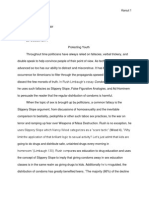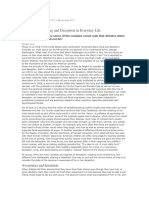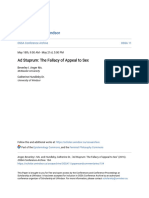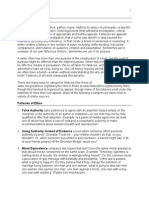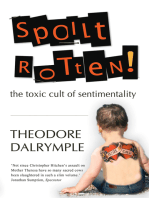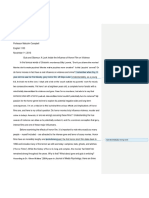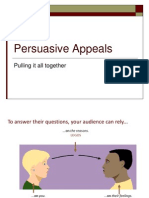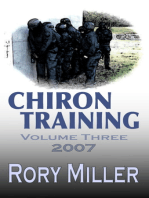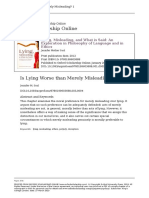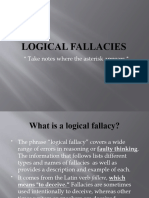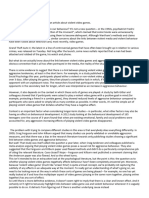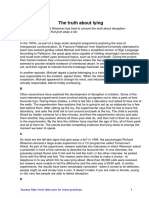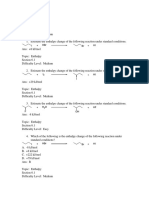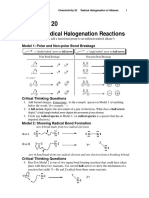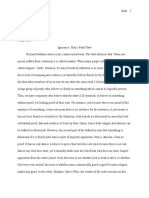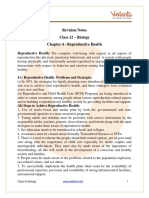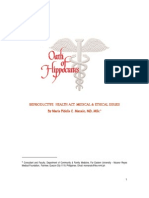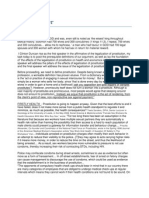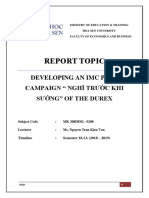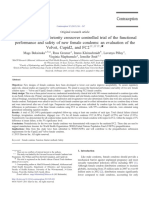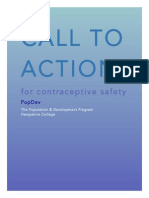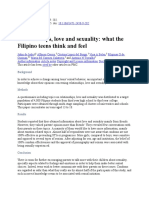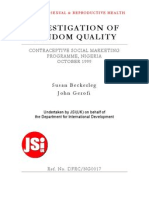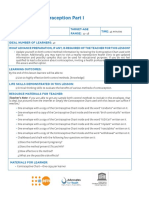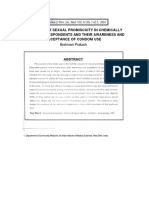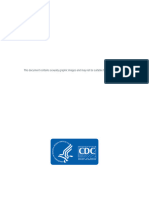Unwrapped - Role of Condoms
Unwrapped - Role of Condoms
Uploaded by
Simranjit KaurCopyright:
Available Formats
Unwrapped - Role of Condoms
Unwrapped - Role of Condoms
Uploaded by
Simranjit KaurOriginal Description:
Original Title
Copyright
Available Formats
Share this document
Did you find this document useful?
Is this content inappropriate?
Copyright:
Available Formats
Unwrapped - Role of Condoms
Unwrapped - Role of Condoms
Uploaded by
Simranjit KaurCopyright:
Available Formats
Kaur
Simranjit Kaur
English 103
Professor Mccormick
15 July 2016
Unwrapped: Role of Condoms in Sex Ed
I know not the year of my birth nor the name they call me. I opened my eyes to a factory
and soon was enclosed in a small square wrapper. I was simply packaged and shipped one day.
There was myself and many others alike. Many of us, arranged tightly in a small box; sealed and
ready to go. From warehouse to factory to truck to store shelf, I made my adventure. Finally, one
day, I was chosen. His darting eyes glanced at us with uneasiness and his grungy hands snatched
us and away we went. Soon, I was moved from the linty denim pocket to the sports jacket
pocket. So warm and dark, I could feel the beat of his heart. That night, we are joined with the
smell of alcohol and dull thumping teenage pop music. Soon after, a girls voice can be heard and
I am soon presented. My appearance does not embark the joy I had foreseen. I have made her
angry and again I am back inside that lonely sports jacket pocket. Timing is everything I
suppose. Perhaps, another day another time, my presence will be appreciated. Unfortunately, this
neatly wrapped and carefully sealed condom will not be used if it were up to those who believes
its role is useless in providing protected sex. Opponents of such contraceptives believe that the
only safe way to have sex is to have no sex at all. One such opinionated opponent, Rush
Limbaugh, voices his position on condoms and the influencing factor they have on high school
students when provided at their schools. In his highly controversial essay, Condoms: The New
Diploma, Rush Limbaugh claims that by providing condoms in schools, we are giving teenagers
permission to behave in promiscuous and dangerous methods of sex. In his perspective, instead
Kaur
of dispensing condoms at schools we should be teaching abstinence and abstinence only. In order
to justify his reasoning, Limbaugh employs many exploitative writing styles. Ergo, in his essay,
Condoms: The New Diploma, Rush Limbaugh relies on logical fallacies, pathos and emotional
appeal, profanity and abrasive tone and language, and overall weak argument to persuade readers
that condoms are useless and abstinence is the only Sex Education to be taught.
With his consistence reliance on logical fallacies throughout the essay, Limbaugh
manifests a truly invalid claim. Firstly, logical fallacies are basically mistakes in the line of
reasoning or logic. The first of many errors of logic he presents with is that of Appeal to Fear.
This logical fallacy employs fear as a persuasion technique to accept a proposition in spite of
evidence or reason. This form of manipulation can be seen as he writes, There have always been
consequences to having sex. Always. Now, however, some of these consequences are severe:
debilitating venereal diseases and AIDS. You can now die from having sex. (Par. 6). Besides the
total lack of proof, it is obvious that just the very act of sexual intimacy is not fatal. However,
using some truth to make his point, Limbaugh creates a weak argument. It is true that
unprotected sex can lead to venereal diseases and AIDS but Limbaugh proposes that any and all
forms of sex will result on the same consequence. He attempts to convince someone out of fear;
targeting someones fear of being infected with STIs and hence shamelessly makes conclusions
without reasoning. Furthermore, another instance of Appeal to Fear is seen when Limbaugh
compares sending children out with condoms as sending them into the grip of a fatal disease.
Limbaugh argues, Who is to know who carries the HIV virus, and on the chance your kid runs
into someone who does have it, are you confident that a condom will provide all the protection
he or she needs? (Par. 8). In respect to Limbaugh, it is true that condoms are not 100% safe and
do not guarantee the spread of infections. However, by targeting parents and their emotional love
Kaur
for their children, he pinpoints the fear all parents have about their children. Hence, he attempts
to convince an audience of parents by stating that abstinence is the only sure way of keeping
their children safe. Moreover, another logical fallacy used in the essay includes Appeal to
Ignorance. In this error of reasoning, an argument is made on the basis of lack of evidence.
Besides the entirety of his essay, some key points stand out. For instance, Limbaugh rapports,
The worst of all of this is the lie that condoms really protect against AIDS. The condom failure
rate can be as high as 20 percent. (Par.17). Firstly, the statistic itself is largely incorrect. In fact,
22 major studies of more than 40,000 condoms used [during sex ] have found that 4.6% of all
the condoms broke and 2.5% of them partially or completely slipped off, for a total failure rate of
7.1%. (Condoms: Little-Known Scientific Facts."). Hence, not only is Limbaugh way off on
his numerical statistic but his claims that condoms fail at protecting against infections is also
invalid. Whereas, in reality, very reputable industries like the CDC explain that with proper and
correct condom usage, the chance of being infected by a STI is decreased. For Limbaugh,
crutching on absolutely no evidence, he jumps to conclusions and appeals to those who may not
have the sense to question his lies. Finally, another logical fallacy employed thought out the
essay is that of False Analogy. Most of his argument is based on making comparisons between
two ideas that are senseless. For example, Limbaugh states, Would you get on a plane--or put
your children on a plane--if one in five passengers would be killed in flight? Well, the statistic
holds for condoms, folks. (Par. 17). As stated above, his statistics are nothing short of
propaganda and lies and now he presents a queer analogy between planes and unprotected sex.
Essentially, Limbaugh attempts to showcase the extreme dangers of sex by comparing it to false
statistics of plane fatalities. Also appealing to the audiences fear, Limbaugh tries to make a
connection between two very different topics, each with incorrect information and substantial
Kaur
lack of evidence and support. Ergo, with numerous uses of error in logic and lack of evidence,
Limbaugh fails to convince his audience the dangers and false nature of condoms.
Alongside his overreliance on logical fallacies, Limbaugh also uses pathos or emotional
appeal to convince his audience of his argument against condoms. Pathos is the Greek term for
suffering and refers to ones emotional influences in arguments. Emotions such as fear, anger,
pity and their opposites are strongly influential on our logical reasoning. Limbaugh, lacking
substantial information, is forced to do just that. The majority of the essay revolves around
Limbaugh targeting potential fears the audience may hold. For example, there are many people
who believe that condoms really are worthless in preventing the spread of STIs and are afraid
their children are heading down the wrong path. Limbaugh focuses much on parental rights in
the lives of their children and focuses on the fear the parents hold regarding teen sex. For
example, Limbaugh targets worried parents of young daughters as he writes, it isn't long
before Johnny, on the verge of bliss, whips out his trusty high school-distributed condom and
urges Susie not to resist him. (Par.3). Now, in this sense a parent might think that their daughter
will think it is okay to lose her virginity on the hopes of the boy being a good first choice and on
the belief that condoms are 100% safe. Since she might think she will not get impregnated, her
parents will never know. This idea makes many parents scared and angry at the same time.
Limbaughs argument that the presence of condoms convinces teenagers that sex is all right
because they are protected, targets parents innate anger, confusion and fear all in one. This form
of persuasion is so very weak. The short story he made up resonates with some audiences but
really does not have any evidence or proof for the promiscuous natures of condoms.
Furthermore, Limbaugh chooses to address his argument with a combination of odd analogies
and fear tactics again. In this example, Limbaugh addresses the night Johnson sources how he
Kaur
caught AIDs. He writes, You approach Magic and say, Hey, Magic! Hold on! That girl you're
going to take back to the hotel with you has AIDS. Here, don't worry about it. Take these
condoms, you'll be fine. Do you think Magic would have sex with that woman [] with only a
condom [as protection?] (Par. 8). Magic Johnsons story is well known and many have
sympathy for the man. Limbaughs use of this figure is to embark a memory of sympathy and
then anger at those who support condom usage. His reasoning is that Magic could have been
disease-free if he had only known that he was going to sleep with someone who had AIDS. This
is not an argument against the effectiveness of condoms rather the existence of STIs and the
search for their cure. He confuses audiences feelings for family members or friends suffering
from AIDs with the suppository ineffectiveness of condoms. All in all, due to his lack of valid
evidence and support of his claims, Limbaugh use of pathos to manipulate the audience is faulty
and creates a weak argument overall.
With his use of ill reasoning comes an abrasive and offensive tone in the presence of
invalid claims and lies. Throughout the essay, profanity and name calling are utilized against
proponents of dispensing condoms in schools. This sharp abrasive writing style creates a very
negative and angry vibe that resonates through the words. Instead of a scholarly argument, it
comes off as a slew of propagandist rants. For example, Limbaugh exclaims, If anyone is trying
to trick students, it's Planned Parenthood and this band of hedonists who try to tell kids that a
condom will protect them from any consequences of sex. (Par. 13). Firstly, the claim he makes
about what Planned Parenthood actually teaches young teens about sex, is incorrect. They do not
teach that condoms will forgo any risk sex presents, but rather it decreases the risk of being
impregnated or being inflicted with a fatal infection when used correctly. Moreover, he attempts
at discounting the reputable authority of Planned Parenthood by calling them hedonists, offering
Kaur
the suggestion that they are lust-filled persons with no real knowledge on the subject. Further,
Limbaugh attacks those who propose that a lack of sex education actually leads to increased
spread of AIDS and STIs by stating, This bunch of curious citizens says that teaching
abstinence puts the children at a greater risk of catching AIDS [] Greater risk? !#$@! How
can that be? What kind of contaminated thinking is this? (Par. 13). Limbaugh reshapes the
essence of the real argument, which is that parents have an issue with schools not teaching actual
sex education as opposed to teaching kids not to have sex at all. What happens when, god forbid,
two teens engage in sex but have a total lack of knowledge regarding how to go about it safely?
Limbaugh took this issue as the parents naively believing that virginity will lead to STIs, of
course not. His further use of unintelligible representations of profanity further weakens the
credibility of his essay. He uses this notation elsewhere in the essay as well, noting his anger and
dissatisfaction with the claims made by the opposing argument. Instead of providing a decent
rebuttal to these claims, he lashes out in frustration. No scholarly or credible piece of writing
imposes the use of profanity in order to convince an audience of an argument. Therefore, his
attempt to persuade the readers of his claims backfire due to his illiterate use of profanity, name
calling and corrosive tone.
In response to Limbaughs claims against the effectiveness of condom placement in
schools, many schools and studies have proven just the opposite. Condoms and other
contraceptives were created initially as forms of birth control. Soon, with the increasing rates of
mortality in regards to STIs it was found that condoms also offer another form of protection.
Limbaugh argues that by providing high school students with the option of having condoms, the
school is increasing pregnancy and STI rates. In his perspective, condoms offer students the
choice of engaging in sex and hence that increases their chance of catching diseases and or being
Kaur
pregnant at such a young age. However, in her article regarding sex education programs, Zoe
Greenberg writes, By coupling interactive sex education with a host of social services, [Sex Ed
programs have] successfully cut teen pregnancy by 40 percent in the communities it serves. And
for a country that spends at least $9.4 billion a year on costs associated with teen pregnancy,
thats a big deal. (Tackling Teen Pregnancy ). In essence, these programs take the time to
listen to young teens and take their questions and issues seriously. Only by taking their worries
as serious matter will teens feel comfortable enough to ask for help or guidance in a serious time
of need. With a mutual trust factor between the students and teachers, the issues revolving
pregnancy and diseases are thoroughly discussed. As opposed to Limbaugh who suggests that
more knowledge leads to more promiscuous behavior, it tends to be the opposite. The more these
teenagers know and understand about sex and the possible consequences, the safer they are.
Further, on the idea of abstinence, though admirable, is against everything our society teaches
teens today. Besides children growing up in religious and traditional families, most parents
themselves lost their virginities at young ages. How can parents tell their children to wait for the
right person or until marriage when they themselves did not do it and turned our relatively fine?
In fact, parents are the most influential figures when it comes to sex. According to the National
Campaign to Prevent Teen Pregnancy, a nonprofit group in Washington, the majority of teenagers
are actually declined to engage in sex then the era of their parents. In her article, Kate Zernike
quotes Sarah Brown, the director of the campaign as saying, The parents are in a 15-20-yearsago thing of having sex was the way to be cool. They didn't come of age in the full-blown
understanding of AIDS and with quite as much attention to teen pregnancy and how it derails
young lives. ( Teenagers Want More Advice). Hence, according to this study, todays
teenagers are less inclined to jump in bed with just anyone and rather focus on school, careers or
Kaur
focus on the nature of the relationship. This change in attitude actually has to do with the fact
that they grew up with the results of STI research. The kids were given information about
unprotected sex and the consequences thereof and hence they now are more cautionary when it
comes to sex. This is in direct correlation with Limbaugh who argues the opposite. Limbaugh
argues that parents are more knowledgeable on safe sex since they were treated with the sudden
scare of STIs. However, according to this study, the parents grew up in a different era in which
sex was taken lightly and a gateway to being cool. Nowadays, with sex education, national
studies and research, teenagers are less likely to engage in unprotected sex as their parents era.
All in all, Limbaughs argument that condom presence in schools would derail students
abstinence and would lead them to engage in more sexual behavior is invalid and faulty as seen
by these studies.
In closing, Rush Limbaughs utilization of logical fallacies, pathos, and abrasive tone
throughout his essay represents a highly ineffective writing style leading to an incompetent
argument as a whole. With his total lack of evidence, support, expertise, and scholarly credibility,
the essay falls short of a propagandist attempt. His views and claims were filled with profanity
and emotional targets. The essay displayed a lack of evidence to support the claim against
condom presence in schools. Many school programs and studies have in fact proven the opposite
and leaves Limbaughs rant invalid. Condoms will always be a controversial topic in this country
but further research shows that its usage is leading to promising results for the future of America.
Works Cited
Kaur
"Condoms: Little-Known Scientific Facts." Human Life International. Human Life International.
Web. 15 July 2016.
Condoms: The New Diploma. Current Issues and Enduring Questions. Eds. Sylvan Barnet
and Hugo Bedau. Boston: Bedford, 2002. 515-518.
Greenberg, Zoe. "Tackling Teen Pregnancy (With More Than Just Sex Ed)." The New York
Times. The New York Times, 23 June 2016. Web. 14 July 2016.
Zernike, Kate. "Teenagers Want More Advice From Parents on Sex, Study Says." The New York
Times. The New York Times, 16 Dec. 2003. Web. 15 July 2016.
You might also like
- RoughdraftlimbaughessayDocument5 pagesRoughdraftlimbaughessayapi-253782349No ratings yet
- Thou Shalt Not Be Aware: Society's Betrayal of the ChildFrom EverandThou Shalt Not Be Aware: Society's Betrayal of the ChildRating: 4 out of 5 stars4/5 (35)
- Relative Reactivities of Several Aromatic CompoundsDocument9 pagesRelative Reactivities of Several Aromatic CompoundsSimranjit KaurNo ratings yet
- Sexual Health Quiz PowerpointDocument59 pagesSexual Health Quiz Powerpointgoldbergleah100% (1)
- An Invisible Crime and Shattered InnocenceDocument6 pagesAn Invisible Crime and Shattered InnocencejensonloganNo ratings yet
- Contraceptive TechnologyDocument68 pagesContraceptive TechnologySravanthi Karingula100% (1)
- Critical Review SampleDocument3 pagesCritical Review SampleAhmad Muammar100% (1)
- The Origins of Lying and Deception in Everyday LifeDocument8 pagesThe Origins of Lying and Deception in Everyday LifeSidra iftikharNo ratings yet
- Ad Stuprum - The Fallacy of Appeal To SexDocument11 pagesAd Stuprum - The Fallacy of Appeal To Sexlarryjackson1189No ratings yet
- Fallacy HandoutDocument4 pagesFallacy HandoutJohn LukezicNo ratings yet
- Sample Essay With Thesis StatementDocument8 pagesSample Essay With Thesis Statementdstqduwhd100% (2)
- A Tale of Three Encounters in One Day: Damian MiltonDocument6 pagesA Tale of Three Encounters in One Day: Damian MiltonyeyesNo ratings yet
- CHAPTER 5 - FallacyDocument20 pagesCHAPTER 5 - Fallacyandualemasmare320No ratings yet
- Funny Narrative EssayDocument6 pagesFunny Narrative Essayibnorvbaf100% (2)
- What Is Plagiarism?: But Can Words and Ideas Really Be Stolen?Document5 pagesWhat Is Plagiarism?: But Can Words and Ideas Really Be Stolen?Cherry Mae AblazaNo ratings yet
- The Post-Truth Era: Dishonesty and Deception in Contemporary LifeFrom EverandThe Post-Truth Era: Dishonesty and Deception in Contemporary LifeRating: 4 out of 5 stars4/5 (2)
- DocumentDocument3 pagesDocumentjainamjainNo ratings yet
- Fallacies Unit 3Document32 pagesFallacies Unit 3Ali SyedNo ratings yet
- "The Power of Social Modeling: The Effect of Television Violence" Dr. Albert BanduraDocument6 pages"The Power of Social Modeling: The Effect of Television Violence" Dr. Albert BanduraGlaiza MaeNo ratings yet
- Fear of Crime A Review of The Literature HaleDocument8 pagesFear of Crime A Review of The Literature Haleafdtuwxrb100% (1)
- Do Essays Have To Be 5 ParagraphsDocument6 pagesDo Essays Have To Be 5 Paragraphspilav0wutyk3100% (2)
- Bullying ReportDocument5 pagesBullying ReportKenneth D. FishmanNo ratings yet
- Interview EssayDocument4 pagesInterview Essayfz67946y100% (2)
- Abstract Essay ExampleDocument49 pagesAbstract Essay Examplexumuqvwhd100% (2)
- Chagas (2020b) - Memes e DesinformaçãoDocument18 pagesChagas (2020b) - Memes e DesinformaçãoDan NamiseNo ratings yet
- Module 7 8 ActivitiesDocument6 pagesModule 7 8 ActivitiesFANNY USERNo ratings yet
- Spoilt Rotten: The Toxic Cult of SentimentalityFrom EverandSpoilt Rotten: The Toxic Cult of SentimentalityRating: 3.5 out of 5 stars3.5/5 (24)
- Sexism EssayDocument5 pagesSexism Essayd3gpmvqw100% (2)
- Literature Review Media ViolenceDocument5 pagesLiterature Review Media Violenceaflsmyebk100% (1)
- Marley Eip Peer ReviewDocument5 pagesMarley Eip Peer Reviewapi-341007110No ratings yet
- Commfaculty - Fullerton.edu Fallacy ListDocument5 pagesCommfaculty - Fullerton.edu Fallacy ListSCRUPEUSSNo ratings yet
- Persuasive Appeals: Pulling It All TogetherDocument47 pagesPersuasive Appeals: Pulling It All TogetherNeha KhandelwalNo ratings yet
- Common Fallacies in ReasoningDocument7 pagesCommon Fallacies in ReasoningRyan SecretariaNo ratings yet
- Persuasive Essay Against Death PenaltyDocument5 pagesPersuasive Essay Against Death Penaltynpvvuzbaf100% (3)
- Refutation Essay OrganizationDocument14 pagesRefutation Essay OrganizationgulingencerNo ratings yet
- L19 Alliteration and Statistics (2023)Document19 pagesL19 Alliteration and Statistics (2023)Soghol MoradiNo ratings yet
- Teenage Pregnancy Argumentative EssayDocument5 pagesTeenage Pregnancy Argumentative Essayafibyoeleadrti100% (2)
- The Antinatalism Magazine September 2017 PDFDocument52 pagesThe Antinatalism Magazine September 2017 PDFAnonymous MZkhGuTNo ratings yet
- Hale 1996 Fear of Crime A Review of The LiteratureDocument6 pagesHale 1996 Fear of Crime A Review of The Literatureea7gjrm5No ratings yet
- Legal Techniques and Logic Fallacies PDFDocument8 pagesLegal Techniques and Logic Fallacies PDFRNJ100% (1)
- Week 6 Saul, Jennifer, 2012. Lying, Misleading, and What Is Said, Oxford - Oxford University PressDocument31 pagesWeek 6 Saul, Jennifer, 2012. Lying, Misleading, and What Is Said, Oxford - Oxford University Pressrowena ngNo ratings yet
- LOGIC CHAPTER 5 - Lecture NoteDocument17 pagesLOGIC CHAPTER 5 - Lecture Notemarshetyohannes85No ratings yet
- ELC501 Sample of An Argumentative Article and The Written Analysis Based On ItDocument7 pagesELC501 Sample of An Argumentative Article and The Written Analysis Based On ItMuhammad Amirull AdlanNo ratings yet
- Mikkel Borch-Jacobsen - Neurotica Freud and The Seduction TheoryDocument30 pagesMikkel Borch-Jacobsen - Neurotica Freud and The Seduction Theoryhioniam100% (1)
- Essay About MotherDocument7 pagesEssay About MotherafhevpkzkNo ratings yet
- Lords Hansard Text For 17 Oct 2001 211017-06Document8 pagesLords Hansard Text For 17 Oct 2001 211017-06api-246003035No ratings yet
- 15 Logical Fallacies You Should Know Before Getting Into A DebateDocument10 pages15 Logical Fallacies You Should Know Before Getting Into A DebateSean FNo ratings yet
- Essays Against School UniformsDocument7 pagesEssays Against School Uniformsafhbebhff100% (2)
- Logical FallaciesDocument29 pagesLogical FallaciesglcatingubNo ratings yet
- Embarrassing Moment EssayDocument8 pagesEmbarrassing Moment Essaymrmkiwwhd100% (3)
- Condom Nation by Emily LimbaughDocument1 pageCondom Nation by Emily LimbaughCrisostomo GregNo ratings yet
- DocumentDocument3 pagesDocumentjainamjainNo ratings yet
- Informa FallaciesDocument52 pagesInforma FallaciestamiratyisakorNo ratings yet
- Satirical Essay On TextingDocument4 pagesSatirical Essay On Textingfz75587x100% (2)
- LyingDocument2 pagesLyingJeff ChungNo ratings yet
- A Position Paper About "Giving Condoms To High School Student"Document2 pagesA Position Paper About "Giving Condoms To High School Student"Cristine Joy Remerata Villarosa93% (14)
- Week 13 14Document39 pagesWeek 13 14Lalie EneroNo ratings yet
- The Truth About LyingDocument5 pagesThe Truth About LyingThảo GiangNo ratings yet
- How We Cheat Ourselves Into Cheating On Each OtherDocument9 pagesHow We Cheat Ourselves Into Cheating On Each OthergisselrojasNo ratings yet
- Nitration of Methyl BenzoateDocument5 pagesNitration of Methyl BenzoateSimranjit Kaur0% (1)
- CH 07Document61 pagesCH 07Simranjit Kaur75% (4)
- Diels-Alder ExperimentDocument7 pagesDiels-Alder ExperimentSimranjit Kaur100% (3)
- CH 06Document34 pagesCH 06Simranjit KaurNo ratings yet
- Mao and China Section LLDocument11 pagesMao and China Section LLSimranjit Kaur100% (1)
- Chem Activity20Document12 pagesChem Activity20Simranjit Kaur100% (2)
- Religion EssayDocument9 pagesReligion EssaySimranjit KaurNo ratings yet
- SR Directions Plus Access MapDocument1 pageSR Directions Plus Access MapSimranjit KaurNo ratings yet
- Algae Classification and Characters: Phylum Classes Common Names/Examples Food Storage Nutrition Pigments ChromophytaDocument2 pagesAlgae Classification and Characters: Phylum Classes Common Names/Examples Food Storage Nutrition Pigments ChromophytaSimranjit KaurNo ratings yet
- AP US History DBQDocument6 pagesAP US History DBQSimranjit Kaur100% (2)
- Class 12 Biology Chapter 4 Revision NotesDocument9 pagesClass 12 Biology Chapter 4 Revision NotesAdesh KannaNo ratings yet
- Final Thesis RevisedDocument24 pagesFinal Thesis RevisedRedge Warren60% (5)
- RH BillDocument13 pagesRH BillDr. Liza ManaloNo ratings yet
- STD Comparison ChartDocument4 pagesSTD Comparison Chartabu ubaidahNo ratings yet
- Thesis On Hiv Aids in IndiaDocument8 pagesThesis On Hiv Aids in IndiaBuyLiteratureReviewPaperSingapore100% (2)
- Maternal Nursing Care - CHPT 6 Human Sexuality and FertilityDocument28 pagesMaternal Nursing Care - CHPT 6 Human Sexuality and Fertilitythubtendrolma100% (1)
- Your Complete Guide To Birth Control Methods in The PhilippinesDocument8 pagesYour Complete Guide To Birth Control Methods in The PhilippinesJobert John BatallonesNo ratings yet
- Mechanical Methods of Family PlanningDocument23 pagesMechanical Methods of Family PlanningJaspere Nicole Aldea100% (1)
- Contraceptive MethodsDocument40 pagesContraceptive MethodsMa. Lourdes CarbonillaNo ratings yet
- Syphilis Fact Sheet PressDocument2 pagesSyphilis Fact Sheet Pressmahaberani_zNo ratings yet
- Compelling Reasons Why You Need SukapornDocument1 pageCompelling Reasons Why You Need Sukaporne2qfyil642No ratings yet
- DurexDocument3 pagesDurexHumberto PantojaNo ratings yet
- Control Premature Ejaculation - Tips and Strategies To Control Premature Ejaculation (PDFDrive)Document20 pagesControl Premature Ejaculation - Tips and Strategies To Control Premature Ejaculation (PDFDrive)furiantofuliongNo ratings yet
- Unitive and Procreative Health Procreation, Creation and EvolutionDocument9 pagesUnitive and Procreative Health Procreation, Creation and EvolutionJustJ ThingsNo ratings yet
- First Speaker ProstitutionDocument3 pagesFirst Speaker ProstitutionClinton DuncanNo ratings yet
- Imc - Report DurexDocument45 pagesImc - Report DurexBox Box100% (1)
- Condom FemaleDocument7 pagesCondom FemaleHuyền ÁnhNo ratings yet
- Applying A Condom CatheterDocument2 pagesApplying A Condom CatheterJoslyn GrossNo ratings yet
- Call To Action For Contraceptive SafetyDocument16 pagesCall To Action For Contraceptive SafetyPopulation & Development Program (PopDev)No ratings yet
- A Position Paper About "Giving Condoms To High School Student"Document2 pagesA Position Paper About "Giving Condoms To High School Student"Cristine Joy Remerata Villarosa93% (14)
- Relationships, Love and Sexuality: What The Filipino Teens Think and FeelDocument13 pagesRelationships, Love and Sexuality: What The Filipino Teens Think and FeelVitas VitalyNo ratings yet
- Condom QualityDocument53 pagesCondom Qualityjs_3bearsNo ratings yet
- 1APSCIadvocacy GroupingsDocument15 pages1APSCIadvocacy GroupingsbruhNo ratings yet
- Aids Hiv AssignmentDocument21 pagesAids Hiv AssignmentGeetha Sarika100% (3)
- Lesson Plan Contraception Part I and IIDocument12 pagesLesson Plan Contraception Part I and IIMary Pyie KinkaewNo ratings yet
- Literature Review On Condom UseDocument6 pagesLiterature Review On Condom Useea98skah100% (1)
- Reasons For Sexual Promiscuity in Chemically Dependent Respondents and Their Awareness and Acceptance of Condom UseDocument7 pagesReasons For Sexual Promiscuity in Chemically Dependent Respondents and Their Awareness and Acceptance of Condom UsestarscribNo ratings yet
- Dental Dam Info Sheet 508Document2 pagesDental Dam Info Sheet 508Light In The DarknessNo ratings yet
